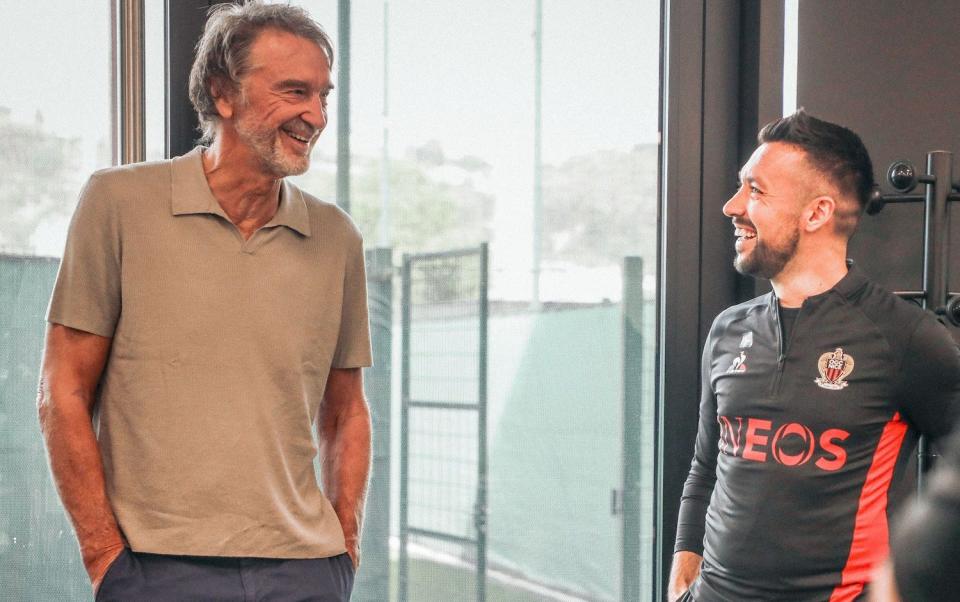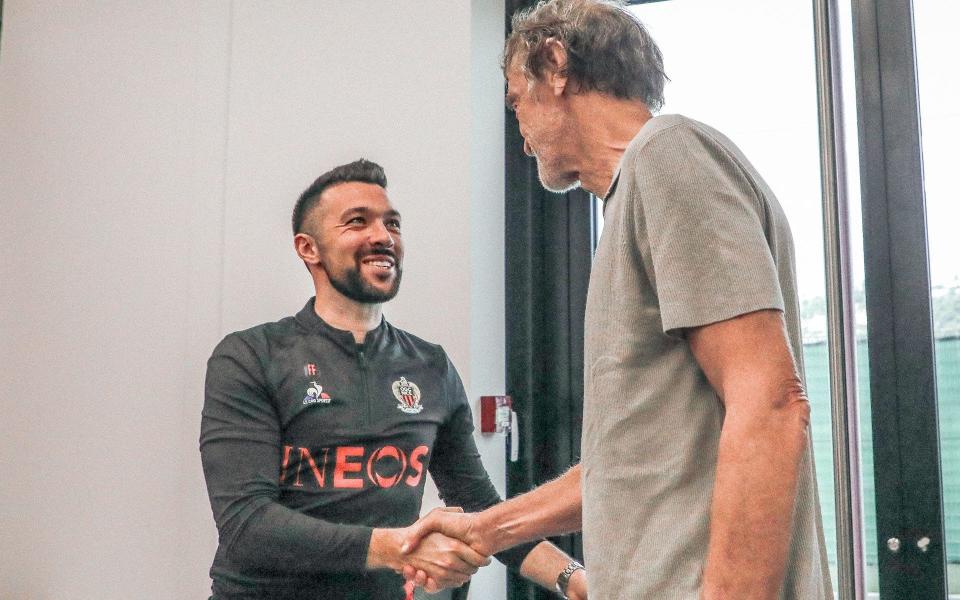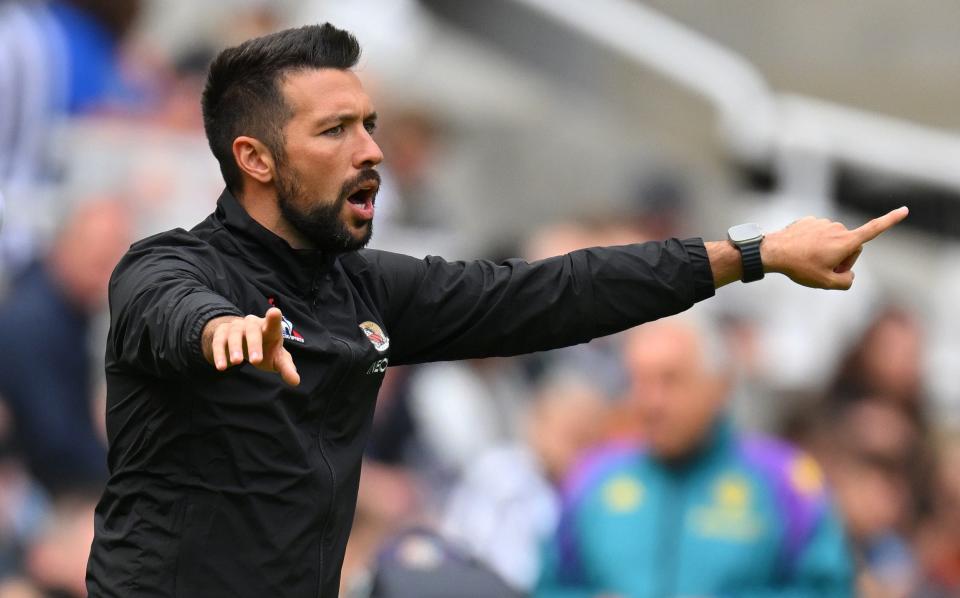‘Sir Jim Ratcliffe really aware of things’: How Francesco Farioli and Ineos transformed Nice

Sir Jim Ratcliffe could have been forgiven for flashing his Ineos data boffins a quizzical look when they first presented him with the name of Francesco Farioli as they searched for a head coach for Nice, the French club he owns.
But as he prepares to oversee an overhaul of Manchester United, appointing 34-year-old Farioli – one of Europe’s youngest coaches – already looks to be the best football decision Ratfcliffe has made to date, with Nice still unbeaten in Ligue 1.
United supporters will also be heartened to find out that two of Ratcliffe’s closest allies, Sir Dave Brailsford and Jean-Claude Blanc, who are tipped to be influential at Old Trafford, played key roles in the appointment of Farioli.
Under Farioli, Ratcliffe’s Nice are one of only three clubs in Europe’s top five leagues who are still unbeaten – the others are Bayern Munich and Bayer Leverkusen – having conceded only four goals and secured back-to-back away victories at Paris Saint-Germain and Monaco.
That start has quickly enhanced the reputation of Farioli, who only 10 years ago was finishing his philosophy degree at an Italian university, scoring 105 out of 110 for his thesis entitled ‘Philosophy of the Game. The aesthetics of football and the role of the goalkeeper’.
‘My interview lasted five hours’
Just as Farioli proved himself to be a keen student, so did Ineos and the Nice sporting director Florent Ghisolfi, who was appointed by Ratcliffe last year, when they first approached the Italian during the summer.
“They made an analysis with data and from the filter appeared some of the names, and I was one of the names. If I’m not wrong, it was in January or if not before,” said Farioli.
“At the end of the season, when they changed coach, I had my first interview with the sporting director Florent Ghisolfi and Dave [Brailsford, director of sport at Ineos].
“It was quite a long interview, like five hours or something. It was a really good introduction and the day after, I had an interview with Jean-Claude Blanc [chief executive of Ineos Sport]. I had one more meeting with Florent, the CEO and the president of Nice. A lot of meetings and a lot of hours, but I felt very happy because they gave me the opportunity to express myself. They were very, very prepared about everything and they were really aware of who they had in front of them.”
Farioli had been out of work when he was first approached by Nice, having previously become the youngest manager in a professional league in Europe when he took over at Turkish club Fatih Karagumruk aged 31 and finished an impressive fifth in his only full season in charge of Alanyaspor.
It was aged just 19 that Farioli was told to give up on his dream of becoming a top goalkeeper and to concentrate on coaching. He has not looked back, starting as a goalkeeper coach and working under Roberto De Zerbi at Benevento and Sassuolo before moving to Turkey and becoming a head coach.
Ratcliffe knew Farioli’s story by the time they met for the first time, but the British billionaire might already believe he has got an even better coach than he had bargained for.
“I met Jim Ratcliffe a few days after [taking the job] because he was very busy,” said Farioli. “But from his side, the first time we met, the feeling he transferred to me, it was really like the feeling of somebody that was really aware of many things. I felt already known before knowing him. It was a really warm welcome.”

The philosopher in Farioli remains. He titled the WhatsApp group he set up for himself and his coaching staff “creative lab” because “it is how we want to work”. He has another group for the independent research team he created, who help to monitor global football trends, alongside data and analysis on leagues, players and clubs.
“I have one parallel group, a small group of people, who are not part of my technical staff but people who work remotely,” said Farioli. “I built it one year ago, like a research group because it is impossible to look at everything when you are working in a club. It’s a group that is working into the future, watching games and studying trends and things, what is happening in Brazil, Argentina, Portugal. Then we all discuss it and this keeps me quite alive and gives me perspective about what is happening around the world.
“That helped me a lot for my first impact in France because when I first arrived here, of course I didn’t have the same knowledge I have now after four months. But it really helped me because I already had quite clear images of the level of the league and the possible problems.
“It’s one guy in Scotland who watches British football and is also passionate about South American football, one in Italy, one guy in Portugal and one in Spain.”
There is also regular contact between Farioli and his bosses at Nice and Ineos, including Ratcliffe, who presented him with the target of securing a top-six finish and European qualification this season.
Nice are second in Ligue 1 after 12 unbeaten games, in which they are yet to trail, and are a point behind PSG.

Explaining the day-to-day involvement Ratcliffe and Ineos have at Nice, Farioli said: “I like to listen to the feedback I receive because it’s good to have different perspectives and different input. Afterwards, I have freedom in the decisions on the pitch
“In other things, a bit more for the medium and long term, there is always an open door. We share our opinions and we have periodic, day-by-day or weekly conversations. But also with the club, we have a monthly review of everything with all the parts involved – about the strategy, about the present and also about the future.
“The ambitions of the club are already quite big with the desire to bring the team back in Europe and to be constantly in the European competition. This is the target, to dream big.”

